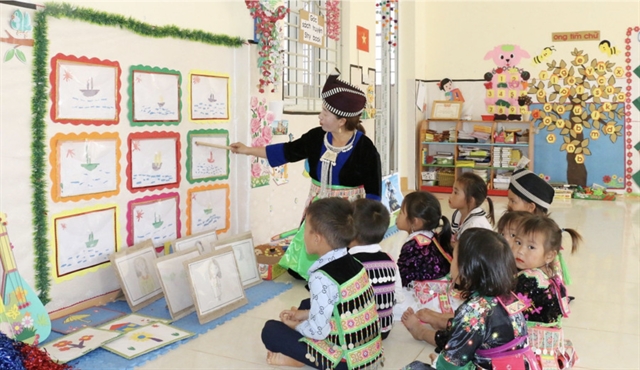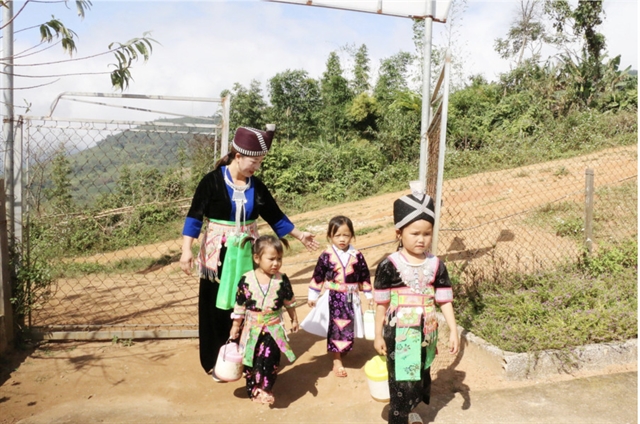 |
| Teacher Lầu Y Pay at a class. Photo giaoducthoidai.vn |
NGHỆ AN – An ethnic woman in a remote mountainous district of Nghệ An Province has overcome prejudice to become a teacher devoting her time for ethnic Mông children.
She is Lầu Y Pay, a 38-year-old Mông ethnic, who has just been honoured by the Ministry of Education and Training for her dedication.
Pay is one of the few Mông teachers at Tri Lễ Kindergarten in Huồi Mới village of Quế Phong District, where she has worked for more than 15 years.
Her house is more than 25km away from the school. Every day, a school day for her begins at dawn. After getting ready, she starts her journey through the forest at 5am to come to her students in the kindergarten.
“I have worn out two motorbikes, but in return, I have transformed from a shy person into an expert driver on every mountainous path here,” the teacher told giaoducthoidai.vn.
“My dream was to become a teacher and now that I am doing the job I love, I’ve grown accustomed to the hardships. I will keep striving to overcome them.”
Overcoming prejudice
 |
| Lầu Y Pay with her students. Photo giaoducthoidai.vn |
Pay is not originally from the area. She was born and raised in Đọoc Mạy commune – an impoverished border commune in Kỳ Sơn District, where 100 per cent of the population are Mông.
In this remote, isolated highland area, her parents worked tirelessly on the fields to ensure their children received a proper education.
Although poor, they were progressive in their thinking and all eight of their children later graduated from universities or colleges, with four of them becoming government officials.
During her school years, friends around her would leave school at 14 or 15 to get married. If anyone stayed in school longer, they would usually drop out after finishing lower secondary school and very few continued on to Mường Xén Town to attend high school.
Pay recalled that growing up in the village, she felt disadvantaged when she saw her peers getting married early.
She feared she would be left without a husband, having children too late.
“But I also saw that those who married early had difficult lives, working only on the fields without any other occupation,” she said.
“My family was already poor. If I did not study and ended up working on the fields like my parents, who knows when our lives would improve? If we waited until we had children to send them to school, it would be too late.
“So, I had to study hard. Even if I married later and had children later than others, at least I would have a stable job, a house and a better life,” she added.
Thus, the Mông girl crossed mountains to attend school in town.
Pay enrolled in the Preschool Education College after finishing high school because she loved singing, dancing and working with children.
After graduation, the young woman applied for jobs in mountainous districts and was accepted as a contract teacher at Nậm Nhoóng Kindergarten in Quế Phong District.
Her period of hard work paid off by being officially recruited and assigned to teach at Tri Lễ Kindergarten in Tri Lễ Commune – one of the most challenging areas of this mountainous district.
Efforts to change ethnic people’s mindset
Back then, if measured as the crow flies, the distance between Pay’s home in Đọoc Mạy Commune and Tri Lễ Kindergarten (Quế Phong District) was just across the mountain.
But there was no road connecting the two communes in the remote areas of Nghệ An Province.
To reach the school from her home, she had to travel a full day, crossing mountains and rivers, covering 300km from Kỳ Sơn District to Vinh City.
Then, the teacher had to take a bus back up to Tri Lễ, another 200km to reach the kindergarten.
But the toughest part of the journey was from the main school to the remote outposts, where sometimes she could ride a motorbike, but in some Mông villages, only trails were available.
She still remembers her first time entering Huồi Mới.
“The kindergarten outpost was just an old wooden house, so it was shorter than my height. The entire village had only fifteen children attending kindergarten,” she recalled.
When she first arrived, the local people had not even sent their children to primary school at the right age, let alone to kindergarten.
“The Mông people believe that children should grow up naturally like the trees and stones in the forest. When parents go to work in the fields, they carry their children on their backs and the children just play and sleep on the fields,” she said.
“Older siblings take care of younger ones, and there is no need to attend kindergarten. Since I am also a Mông person, raised on the fields, I understand this mindset and belief well.”
Encouraging children to attend school has been a long story of changing deeply ingrained beliefs and practices that have persisted through many generations of Mông people.
The only way was to visit every home, every field, talk to and persuade the parents.
“If one day did not bring change, then it would take many days, many visits, many months, persisting like this,” she said.
By the second year of her stationing, the number of children at Pay’s outpost had doubled to about 30.
In the following years, the number of students was maintained and even increased, reaching 50 in some years.
This school year, Huồi Mới has 68 kindergarten children, divided into two groups with four teachers and Pay is in charge of the outpost.
Three years ago, the Huồi Mới outpost was rebuilt, providing a more spacious classroom and a place for the children to nap in the afternoon, leading to increased support from the parents.
The children’s meals, provided in the form of boarding house meals, are also prepared more carefully by the parents.
Rooting in a new hometown
After working for some years, Pay married a man who is also a teacher at a primary school in Tri Lễ Commune.
Sharing the same profession, the same dedication and a love for the children of the mountainous area, the couple supports each other both in life and work.
Tri Lễ is a border commune with a large area, including six Mông villages in remote, isolated areas, known for having many ‘No’s’… no electricity, no convenient transportation, no market, no healthcare station, no communication signal.
Therefore, these six villages were assigned their own Tri Lễ 4 Primary School to make it easier for students to attend.
Since the establishment of the new school, another ‘No’ has been added: no teachers.
Due to the extremely difficult conditions, the Quế Phong District’s Department of Education only assigned male teachers to work and live in these villages.
Pay has long completed her ‘duty’ and faced the challenges of being a young teacher and she now has the opportunity and eligibility to transfer to the central school.
However, she has chosen to stay in Huồi Mới – the distant, remote Mông village that has become familiar, close and her new hometown.
“The school has offered to transfer me to the main school, but if I accepted, another teacher would have to replace me. They do not know the Mông language and have to learn each phrase and visit each household, which would be hard for my colleagues,” she explained.
“Meanwhile, the villagers and children in Huồi Mới are already familiar with me. As a Mông person, born in the mountainous area, I should serve my own people and take care of the children here.”
Acknowledging her dedication, passion, and responsibility, the Ministry of Education and Training honoured Pay as a distinguished national teacher.
“I never imagined that my life would be honoured like this. Being recognised as a distinguished teacher and being invited to Hà Nội to meet the Ministry of Education and Training leaders is an extraordinary experience in my career, especially for a teacher stationed in a remote border commune,” said Pay.
“I see this as the education sector’s care and support, motivating me to stay dedicated to my work, my homeland, and the children here.” VNS
- Reduce Hair Loss with PURA D’OR Gold Label Shampoo
- Castor Oil Has Made a “Huge” Difference With Hair and Brow Growth
- Excessive hair loss in men: Signs of illness that cannot be subjective
- Dịch Vụ SEO Website ở Los Angeles, CA: đưa trang web doanh nghiệp bạn lên top Google
- Nails Salon Sierra Madre
 VnExpress News The News Gateway of Vietnam
VnExpress News The News Gateway of Vietnam





